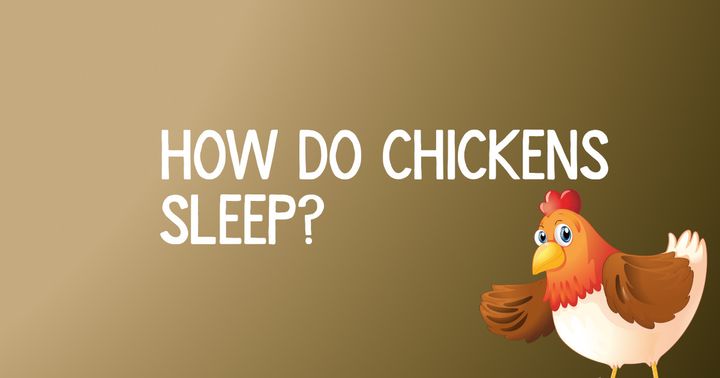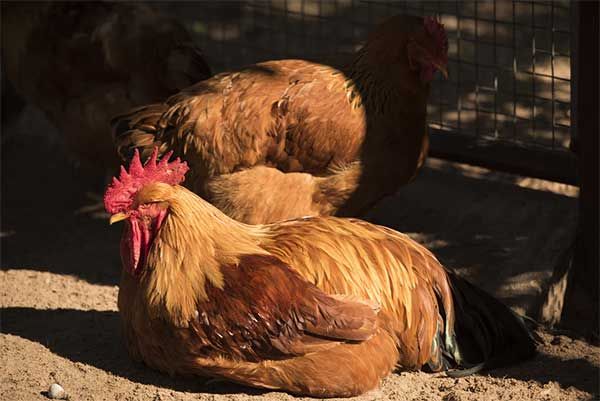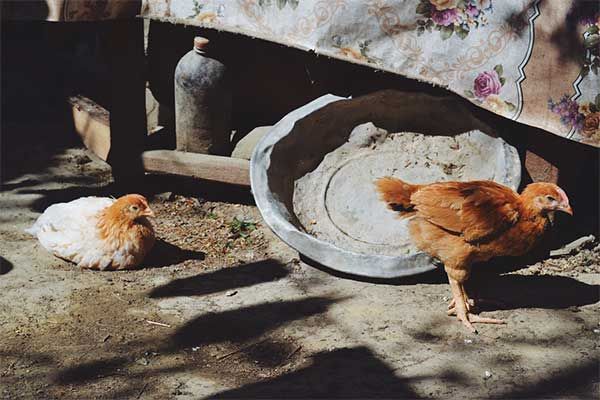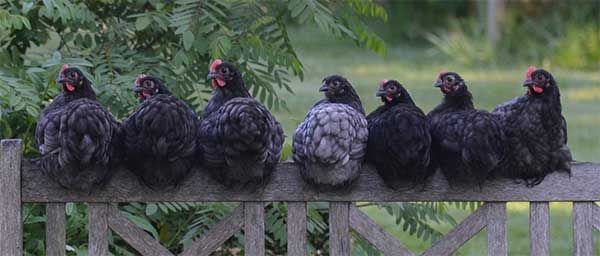How Do Chickens Sleep?



If you have been checking in on your chickens and wondering exactly how they are sleeping then you're not alone. Chickens have different ways of sleeping. And one of them is quite strange.
Chickens, amazingly, can sleep with one eye open. You may have seen your chickens be perfectly still, appear as though they are sleeping, but with one eye still wide open and functioning.
This is because your chicken is half asleep. Or, more accurately, half of your chicken is asleep.
Chickens sleep with one eye open so that they can watch out for predators. It's a useful evolutionary development and is also incredibly impressive.
But they don't just doze off with one eye open and unaware. A chicken's brain is actually split into two halves, or "hemispheres".
Human brains are also split into two halves but definitely not to the same extent. Humans can sleep with their eyes completely or partially open. But this kind of "cat nap" isn't an intentional act.
Chickens are able to rest one half of their brain while the other stays awake. This means that they can have a nap and recharge one half, while the other keeps an eye out (literally) for potential predators.
But sleeping with one eye open is how chickens sleep sometimes. They don't always do this.
Researchers have noted that, when sleeping near one another in a flock, the chickens closer to the center sleep with both eyes closed.
The chickens on the edges sleep with one eye open to keep a look out for anything dangerous that might be coming their way.
Chickens have a few different ways of sleeping. They can sleep for long periods of time or for just for 15 seconds!
This is unlike humans who need a great deal of sleep to reset and refresh for the next day. This is primarily due to the fact that humans do have more complex brains than chickens.
If this strange sleeping habit has intrigued you, read on for some of the more technical and scientific aspects of chicken sleep.

Table of Contents
Why Chickens Sleep this Way
So how exactly does this work? What's the science behind this brain schism? Does it mean that chickens can always be half asleep?
This kind of sleep is known as unihemispheric slow-wave sleep. USWS means that not only is one eye open but one half of the brain is actually asleep. The left eye is connected to the left side of the brain. And the right eye to the right side.
So, when the left eye is closed, the left side of the brain is resting. And vice versa.
Humans have right and left sides to their brains which complete different functions. But not in the same way as chickens. Chickens' brains are physically divided into two hemispheres.
As we've already mentioned, this sleeping style is useful for watching out for predators. That's why the chickens on the edges have one eye open but the ones in the middle are fully asleep. Chickens aren't the only birds that do this.
Scientists studied a group of mallad ducks who also slept in a row. The ducks on the outer edges kept one eye open to look out for predators while the ones in the middle slept completely.
After a few hours, the ducks turned around and rested the other side of their brain.
Generally, although this isn't proven, chickens who are lower down in the pecking order will sit on the outside and "guard" the others. There is often quite a clear hierarchical structure within chicken coops.
Other Sleeping Habits
So, we know that chickens sleep with one eye open, which is already pretty strange. But is there anything else to know about how these feathered friends take their rest?
Sleeping with one eye open is the most interesting and unique chicken ability, but it isn't the only way they sleep.
Chickens, and other birds, have surprisingly similar sleeping habits to humans and other mammals. This, of course, comes down to similarities in the brain.
No one is suggesting that chickens are as complex as humans. But they are intelligent creatures that have feelings, can mourn another chicken's death, learn bird song, build a nest, and remember where they have hidden things such as food.
These are all complex mental abilities. So it is no surprise that chickens have complex sleeping habits.
But, although they have similar habits to humans, they are not the same. They experience Rapid Eye Movement (REM) sleep, which is when both humans and chickens dream.
The difference between REM sleep in humans and chickens (apart from the fact that we can ask humans what they dream about) is the length.
REM in humans can last hours, whereas in chickens it last only a few minutes, sometimes only a few seconds.
Chickens also experience Slow Wave sleep. SW sleep is an incredibly deep sleep when the brain processes all of the information from the day and memories formed throughout the day are stored. This makes the brain ready to take in new information the next day.
This is really deep sleep in humans. If humans don't get enough SW sleep, then they will eventually have to catch up on it. Humans can even become ill if they don't get enough sleep.
This is why, if you haven't slept for a few days, you end up sleeping for a long time when you eventually get to rest.
Your brain hasn't had time to catch up and process all the information that it has taken in. So it needs to take a bit longer to catch up.
But it isn't the same with chickens. Chickens don't require the same length or depth of sleep as humans. They also don't become ill if they don't sleep deeply or well enough. But they are able to catch up on lost sleep.
Can Chickens Dream?
Well, interestingly, scientists believe that chickens do actually dream.
REM, which chickens experience, indicates dreaming. What do they dream about? Is one half of their brain looking out over the coop while the other half dreams of soaring over the fence? We don't know. It seems no one has been able to ask them.
But we do know that researchers believe that chickens dream. Their dreams are likely based on emotions. Researchers aren't entirely sure. Just as they aren't sure why exactly humans dream. There are a lot of theories but no on can make any solid claims.
The brains of both humans and chickens are as active when they are asleep as when they are awake. They're just carrying out different functions. Sleep is necessary but are dreams necessary? It's not entirely understood.
Some theories as to why humans dream is that they help us to process emotions. That's why, if something has been bothering you, it usually comes up in a dream.
So it's interesting to think that chickens dream. If, like some scientists believe, dreams occur to help process emotion then what emotions do chickens feel?
As has already been mentioned, chickens are intelligent creatures and do feel emotions. They have the emotional capacity to mourn and to feel empathy.
So they could be dreaming about a friend or chick they have lost or the threat of predators. Or, they could simply be dreaming about attempting to fly or building their nest.
Chickens are fascinating creatures and are surprisingly complex. As they are such common animals, people often mistake them for being simple or unintelligent.
But they are emotionally intelligent and have complex brains. They might not have the same mental capacity as humans but we are more similar than you might think.
The Best Rest for Chickens
Now that you know the sciencey bits of chicken sleep, let's get onto what you can do to make sure your chickens have the best rest possible.
It's a good idea to make sure your chickens are as comfortable as possible. It's always best to be comfy and cozy when on the lookout for predators. It's an important thing to do but that doesn't mean your chickens shouldn't be getting the best rest they can.
As with pretty much any creature that has ever existed, especially humans, your chickens will generally be happier when they are well-rested.
They may appear to be relatively grumpy creatures (to be fair, we would probably all be grumpy if we were constantly on the lookout for any foxes who might happen upon our homes) but they do need to be kept happy.
The material you put down on the floor of the coop is important for a range of reasons. It will be where the chickens sleep but also where they lay their eggs and defecate. This means that they will need a soft landing for the eggs and something easy for you to clean up, along with the droppings.
The best bedding options are:
- Hay or straw
- Sand
- Cedar shavings
- Pine shavings
- Shredded leaves
- Shredded paper
- Grass clippings
But what about where chickens sleep? That will have an important bearing on your chickens' rest, which will have a bearing on their health and happiness.
This all might sound a bit strange but once you get to know your chickens, you will realize that they are capable of feelings and have personalities. And happy hens lay more eggs too!
Keeping Up With the Coop
So, now that you have made your chicken's coop lovely and comfy, they should be happy, right? Well, chances are they aren't sleeping where they should be.
A common concern that chicken owners have is about where their chickens are sleeping. Often, chickens choose to sleep in their nest boxes or on the floor of the coop.
Although they should, of course, have comfortable bedding for laying eggs. This isn't actually what they should be sleeping on. They should really be sleeping on the perch.
This is due to a few reasons, mostly related to the chickens' health. As mentioned above, the bedding on the floor is useful for cleaning up droppings. So, if chickens begin roosting on the floor, that means they're roosting amongst those droppings.
This isn't great for obvious reasons. But the droppings actually give off ammonia fumes. This can make your chickens ill and the flock may develop respiratory problems.
Because of the way they will be sitting on the floor instead of on the perch, the chickens may also develop problems with their legs. Their joints can become swollen and they can even begin to lose feathers.

Breaking Bad Sleeping Habits
So, what can you do about this? When you first bought chickens, training them probably wasn't one of the things you expected to do with them. But you're going to have to!
Like a lot of other animals, chickens sleep during the night. Typically, they will sleep from dusk to dawn.
So, when it begins to get dark, simply lift the chickens that have been roosting on the floor up onto the perch.
They may completely disregard this and hop back down. But don't give up! Just keep picking them back up and placing them on the perch.
Do this as often as is necessary, every night if you have to. Eventually, after a few days, they will start to get the idea.
If they don't, and you're able to, you can always try lowering the perch. That may help with the issue. Chickens don't necessarily need to be up very high when they are sleeping. Just off the ground and away from the bedding.
Conclusion
The way chickens sleep is surprisingly similar to humans. Except, in this regard, they are almost more impressive.
Being able to sleep in short stints or with one eye open would be useful for humans. But, evolutionarily, chickens have a lot more immediate predators than humans do.
Even in your coop at home, chickens are having to keep an eye out for foxes and other animals that might want to attack and eat them.
But now you know that your chickens are probably sleeping just as they need to be. And you're probably pretty impressed by how complex and intelligent they are.
As you get to know your chickens, you will eventually learnt that they have different personalities and are fascinating creatures. Having a split brain is only one way that these animals are so interesting.
So, if you read this article because you thought that your chickens have been winking at you, trying to let you in on some secret or trying it on with you.
You now know that they're just having a little nap.

